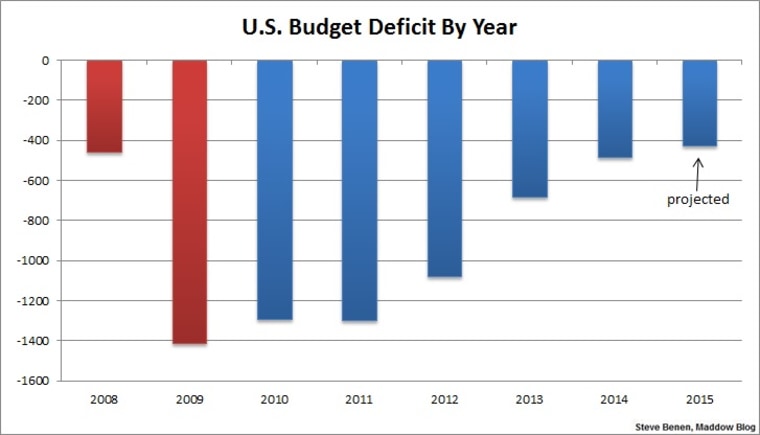
Even at the time, Cantor's rhetoric didn't make any sense -- the deficit was shrinking quickly, not growing. Two years later, however, it's almost amusing to realize how little we've heard about the deficit lately. The Hill reported the other day on the latest CBO projections:
The budget deficit for 2015 is expected to drop to roughly $425 billion, according to a report released Friday by the nonpartisan Congressional Budget Office (CBO). That's down from the $486 billion the CBO projected in March. If it drops to $425 billion by the end of the fiscal year on Sept. 30, it would be a seven-year low for the government's annual budget shortfalls.
I looked for press releases from the "Obama is turning us into Greece!" crowd, eager to see them celebrate President Obama's striking record on deficit reduction, but so far, nothing has turned up. Maybe they're busy.
And in practical terms, that's a shame. The vast majority of Americans are absolutely certain -- thanks to deceptive Republican rhetoric and unfortunate news coverage -- that the deficit has soared in the Obama era. Late last year, a Bloomberg Politics Poll found that 73% of the public believes the deficit has gotten bigger over the last six years.
The year before, the same pollster found that only 6% of Americans realized the deficit was shrinking. It helps explain why the president hasn't gotten any credit for $1 trillion -- that's trillion with a "t" -- in deficit reduction, which seems like the sort of development Tea Partiers and the Beltway's Very Serious People should consider an extraordinary accomplishment.
As we talked about last year, it's tempting to conclude that the public's confusion doesn't matter. In the Clinton era, the deficit disappeared entirely, and Americans had no idea.
But there's another side to this. Whether or not Americans know and/or understand the basics of the fiscal argument may not have a practical impact on the debate itself, but the fact remains that voters are ultimately responsible for electing policymakers. If Americans believe, incorrectly, that the deficit is getting bigger, these same voters may be inclined to vote for candidates who'll slash public investments and undermine social-insurance programs -- which would have real-world consequences.
In the meantime, there's a big budget coming. With Obama already having slashed the deficit by $1 trillion, congressional Republicans have turned their attention to shutting down the government over issues unrelated to the deficit.
Postscript: To reiterate a point from last fall, I don't necessarily consider this sharp reduction in the deficit to be good news. If it were up to me, federal officials would be borrowing more, not less, taking advantage of low interest rates, investing heavily in infrastructure and economic development, creating millions of jobs, and leaving deficit reduction for another day.
That said, if we're going to have a fiscal debate, it should at least be rooted in reality, not silly misconceptions. And the reality is, we're witnessing deficit reduction at a truly remarkable clip. Every conservative complaint about fiscal recklessness and irresponsibility in the Obama era is quantifiably ridiculous.